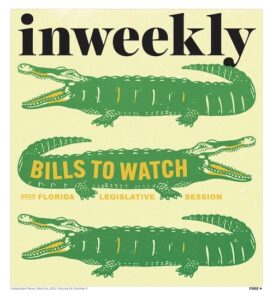
In this week’s Inweekly, we review the bills sponsored by our local state lawmakers and list other bills to watch. The new issue goes live on inweekly.net at 11 a.m.
The First Amendment Foundation recently analyzed over 130 bills that impact public records, free speech, and government transparency. The verdict? The threats to our rights far outweigh the opportunities for progress.
- According to FAF:
WORST OFFENDERS
Silence Critics SB 752 and HB 667 would force news organizations, bloggers, and even regular folks posting reviews online to remove allegedly defamatory content within a tight timeframe or face lawsuits. The vague language makes compliance nearly impossible, creating a weapon to chill free speech.
New Shield: SB 268 and HB 789 would shield public officials from accountability by hiding their home addresses and phone numbers. The justification? Vague claims about “potential threats.” Listen, if you’re running for office, voters deserve to know if you actually live in the district.
BILLS TO SUPPORT
SB 1434 would strengthen our public records laws by ensuring prompt responses and prohibiting excessive fees. Agencies must acknowledge requests within three business days or forfeit charging fees.
HB 1321 and SB 1726 would end the secrecy in university president searches, repealing the 2022 exemption that allows candidates’ identities to remain hidden until the final stages.
LETTER FROM FAF
Friends,
It’s that time again—Florida’s legislative session is underway, and lawmakers are debating and voting on the bills they’ve been drafting for months. With the agenda now set, the First Amendment Foundation has analyzed the proposed legislation that could either strengthen or further erode Floridians’ rights to free speech and government transparency. Unfortunately, the threats far outweigh the opportunities for progress.
More than 130 bills this session touch on public records, free expression, and open government. We are focusing on the worst offenders—proposals that would expand secrecy, weaken Florida’s Sunshine Laws, and suppress public discourse. At the same time, we are championing the few bills that aim to restore transparency and accountability.
Below, we highlight the most egregious attacks on your rights, as well as the most promising reforms. This list is not exhaustive, and we welcome your input—if you know of bills that should be on our radar, please let us know. Most importantly, make your voice heard. Email, call, or write your legislators and the governor’s office. Government by the people only works when you speak up.
Bills We Oppose
SB 752 & HB 667 – Defamation and Speech Suppression
These bills (sponsored by Sen. Simon and Rep. Grow) would require news organizations, bloggers, social media users, and online reviewers to remove allegedly defamatory content within a specified period—or face lawsuits and financial penalties. The legislation is poorly written, vague, and dangerous, making it nearly impossible to fully scrub content from the internet. If passed, these measures would create a chilling effect on public discourse, journalism, and online speech.
SB 268 & HB 789 – Shielding Public Officials from Accountability
Sponsored by Sens. Jones and Brodeur and Reps. Valdes and Duggan, these bills bundle dozens of public records exemption efforts currently under consideration into a broad, sweeping measure that would hide the home addresses and phone numbers of state and local officials—including the governor, legislators, and county commissioners. The justification? A vague, unsubstantiated claim of “potential” threats and harassment. While some national studies have reported that state lawmakers around the country have reported increases in threats, no real data is provided to support the bill, nor is there a compelling argument for overriding Floridians’ constitutional right to government transparency. If passed, these bills would allow elected officials to conceal where they live—potentially preventing the public from knowing whether they reside in the districts they were elected to serve. If threats are truly a concern, the answer is to prosecute criminals—not to strip away public access to critical information.
HB 1443 & SB 1266 – Marsy’s Law by Another Name to Potentially Shield Police Misconduct
These bills (sponsored by Rep. Valdes and Sen. Gruters) seek to revive provisions of Marsy’s Law that Florida’s Supreme Court struck down last year. While they claim to protect crime victims, they contain troubling language that could once again be used to shield police officers from public scrutiny. Under HB 1443, officers who claim they were victims of a crime would have their identities automatically hidden for 48 hours, with extensions of up to 30 days at the discretion of their agency heads. This loophole has been exploited in the past to conceal officers involved in use-of-force incidents. Public trust in law enforcement demands transparency—not secrecy.
Bills We Support
SB 1434 – Restoring Public Records Accountability
Sen. Rouson’s bill aims to strengthen Florida’s public records laws by ensuring prompt responses, prohibiting excessive fees, and introducing penalties for agencies that fail to comply. It would require agencies to acknowledge public records requests within three business days, either providing the records, estimating the timeline and costs, or citing a specific legal exemption. Importantly, it would prohibit agencies from charging fees if they do not respond within the required timeframe. FAF played a key role in shaping this legislation, and while it lacks a House companion and may not be heard this session, it marks an essential first step in fixing Florida’s broken public records system.
HB 1321 & SB 1726 – Ending Secrecy in University President Searches
These bills (sponsored by Rep. Salzman and Sen. Calatayud) would repeal the 2022 exemption that allows university and college boards to keep the identities of presidential candidates hidden until the final stages of the selection process. The legislation would also strip the Board of Governors of its power to influence selections, introduce term limits for board members, and require all members to be Florida residents. Reopening presidential searches to public scrutiny is a crucial step toward restoring transparency in higher education.
Take Action
The fight for open government and free speech is far from over. The First Amendment Foundation will continue to monitor these and other bills throughout the session, keeping you informed and advocating for your right to know. If any of these bills concern you—whether for or against—reach out to your representatives and senators. Let them know that Floridians expect transparency, accountability, and the protection of free expression.
For ongoing updates, visit www.floridafaf.org and follow us on social media.
Bobby Block
Executive Director
First Amendment Foundation




